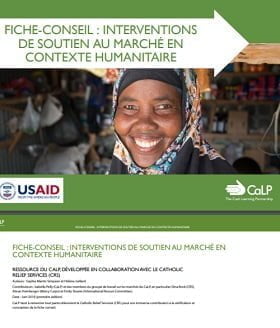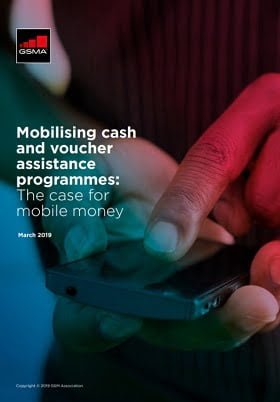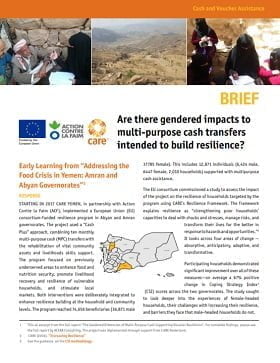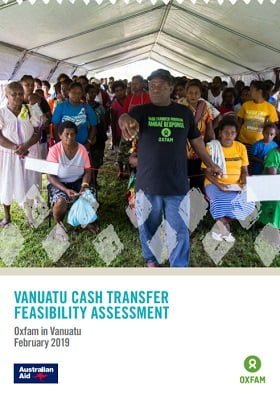Marchés
Lors de la conception d’une intervention humanitaire et de la prise de décisions quant à l’utilisation des transferts monétaires, l’analyse générale des options de réponse doit inclure une analyse de marché. Il est prouvé qu’offrir un soutien ciblant le fonctionnement des marchés accélère la reprise et accroît la résilience dans les zones affectées par une catastrophe.
De nombreuses organisations ont investi dans la mise au point d’outils visant à faciliter l’analyse de marché et réfléchissent à la mise en place de programmes basés sur les marchés plus holistiques. Elles envisagent des interventions tirant profit du marché (basées notamment sur des transferts monétaires aux populations affectées), ainsi que des interventions soutenant directement les marchés (comme l’octroi de subventions conditionnelles aux vendeurs/euses pour la remise en condition du marché).
Initiatives associées
Contenu associé

1.2 Introduction à l’analyse de marché
Cours
Ce cours de 30 minutes offre une introduction à l’analyse de marché pour les contextes d’urgence. Il contient des contributions d'experts dans ce domaine. Ce cours a été développé en collaboration avec l'International Rescue Committee et le CALP Network et grâce au financement d’USAID/OFDA et de l’Agence Suisse pour le Développement et la Coopération. Il est destiné aux...

2.4 Un guide pratique pour l’analyse de marché
Cours
Ce cours en ligne de 3.5 heures vise à fournir aux équipes qui conduiront des analyses de marchés en contextes humanitaires une compréhension approfondie de la théorie et des étapes à suivre afin de leur permettre de comprendre le pourquoi et le comment du processus à suivre. Les participants seront guides à travers un scenario d'analyse de marchés d'urgence. Ce cours s'appuie sur...

Fiche-Conseil : Interventions de soutien au marché en contexte humanitaire
Guides et outils
La fiche conseil définit le programme de soutien au marché en contexte humanitaire et le décrit dans la pratique. Elle permet aux praticiens humanitaires d’envisager systématiquement des interventions de soutien au marché, parallèlement à d’autres activités du programme. Le champ d’application comprend des interventions de soutien au marché axées sur l’offre/la disponibilité...
Thematic lead
Latest

Analyse des dynamiques sociales et des pouvoirs des parties prenantes pour la mise en place de Transferts Monétaires à Usage Multiple (TMUM) pluriannuels au Nord Mali
Rapport
Six ONG internationales (Action contre la Faim, Danish Refugee Council, Handicap International, International Rescue Committee, Oxfam et Solidarités International) ont mis en place un programme de transferts monétaires à usage multiple au Mali ; la deuxième phase de cette intervention de filets...

Minimum Expenditure Basket Harmonization Guidance
Guidelines and Tools
The present Minimum Expenditure (MEB) Guidance is an operational tool for the Refugee Response to inform humanitarian multi sector and/or multipurpose cash assistance to meet food needs and a broader set of essential needs of refugees in Uganda.

Mobilising cash and voucher assistance programmes: The case for mobile money
Guidelines and Tools
This report offers recommendations for both humanitarian organisations and mobile money service providers regarding the partnerships required to enable effective and efficient use of mobile money in humanitarian contexts.

Cash for Work (CFW) Guidance Note
Guidelines and Tools
Cash for Work interventions provide employment to unskilled and semi-skilled workers on labour intensive projects such as rehabilitation of irrigation systems, soil conservation, and road construction and maintenance.

MEB Interim guidance document (Kenya)
Guidelines and Tools
The recent years of humanitarian responses in Kenya has seen the use of Cash and Voucher Assistance (CVA) increasingly being adopted in various interventions and across sectors by both the state and Nonstate actors. This is because besides being cost effective, CVA enables recipients of humanitarian...

Le ciblage dans les systèmes de protection sociale : étude comparative sur deux méthodes
Rapport
Les filets sociaux sont en train de devenir un instrument clé des politiques visant une réduction de la pauvreté en Afrique sub-saharienne et constituent un élément de base des systèmes de protection sociale qui incluent la protection sociale adaptative. Les systèmes de protection sociale visent à...

Reflections and recommendations from evaluations of the 2017 CVA Somalia Drought Response
Report
Improving our response to drought to avert crises through the use of cash and voucher assistance requires us to build on experience. This paper pulls together reflections and recommendations from a review of eight evaluation reports, reviews and studies that were conducted during or after the 2017 drought...

Grand Bargain Workshop: Linking Humanitarian Cash and Social Protection
Report
Over the past decade, the use of cash transfers in humanitarian crises has increased. Moreover, humanitarian interventions now increasingly move beyond immediate crisis response and link to recovery and development initiatives – such as social protection – as part of the humanitarian-development...

Bridging the Mobile Gender Gap for Refugees
Report
Mobile phones have become an increasingly powerful tool with which to deliver life-enhancing information, services, and opportunities to millions who have not been able to access them before. This case study analyses data from two refugee contexts in East Africa to understand the degree to which women are...

Celebrating Three Years of Membership and 10 New Members
Blog Post
It has been three years since the CALP Network first expanded its membership beyond its 'founding five' members. We welcome in the new year with the addition of 10 new members, bringing our total number to more than 80.

The CALP Network-Asia Pacific Regional Cash Working Group learning event report
Report
On 20-22 May, 27 cash working group (CWG) coordinators and regional technical focal points convened from Afghanistan, Fiji, Indonesia, Laos, Myanmar, Nepal, Pakistan, the Pacific region, the Philippines and Vietnam to share experiences and strengthen coordination between country, regional and global...

Are there gendered impacts to multi-purpose cash transfers intended to build resilience?
Report
Brief from full report “The Gendered Dimension of Multi-Purpose Cash Supporting Disaster Resilience” extracting the specific gendered findings from a study on the impact of an EU funded project that used a “Cash Plus” approach, combining ten monthly multi-purpose cash (MPC) transfers with the...

Rapport Annuel du CALP Network 2018/19
Rapport
Le rapport annuel du CALP Network, portant sur l’exercice 2018-2019, présente l’évolution du CALP Network en tant que réseau mondial d’acteurs humanitaires, depuis sa création en 2005. Il met en lumière l’utilisation, l’impact, la qualité et l’amélioration des transferts monétaires au...

Identification et atténuation des risques d’abus de pouvoir liés à l’assistance monétaire au Burundi
Rapport
Ce document présente les enseignements tirés de la mission conjointe HCR-PAM au Burundi visant à identifier et à atténuer les risques d’abus de pouvoir liés à l’assistance monétaire. L’analyse s’est focalisée sur l’assistance monétaire par téléphone mobile pour le retour volontaire...

Improving the Coordination of Humanitarian Cash Transfers – a Fool’s Errand?
Report
Master’s thesis – NOHA Master’s in International Humanitarian Action. This thesis evaluates the extent to which attempts to improve the coordination of multi-purpose cash transfers (MPCTs) in humanitarian contexts can succeed. The first part of the paper focusses on outlining the existing...

Displaced & Disconnected – Connectivity for Refugees
Report
UNHCR recognizes that one of the ‘hard stops’ in facilitating mobile connectivity and access to finance for displaced populations is non-conducive regulatory environments. In particular, ID-related legal requirements have proven a significant barrier to access. For example, a refugee who cannot...

6 Key Points to Address: Using Learning to Strengthen Cash and Voucher Assistance in the 2019 Drought Response in Somalia
Report
A summary of learning from Evaluation reports from the 2017 Somalia drought response.

Vanuatu Cash Transfer Feasibility Assessment
Report
Oxfam conducted this Vanuatu Cash Transfer Feasibility Assessment in partnership with Youth Challenge Vanuatu, Department of Agriculture & Rural Development, and the Vanuatu National Statistics Office with funding from the Australian Department of Foreign Affairs and Trade (DFAT) through the Australian...

Healing and Enabling- Stories from Typhoon Mangkhut Response
Report
The response to Typhoon Mangkhut is one of Christian Aid’s purely cash-based response that incorporate a community-led approach in its design and execution. Undertaken with our NGO and community partners, it has been in keeping with Christian Aid’s development principle of working with, and through...

Feasibility Study on Cash Transfer Programming for the Returnees and the Host Communities in Gedeo and West Guji in Ethiopia
Report
This document reveals the outcome of a feasibility study on cash transfer programming targeted for the returnees and the host communities in Gedeo and West Guji Zones.
The major objectives of the study were as follows:
1. Understand general cash transfer environment in Ethiopia
2. Validate the needs of...
